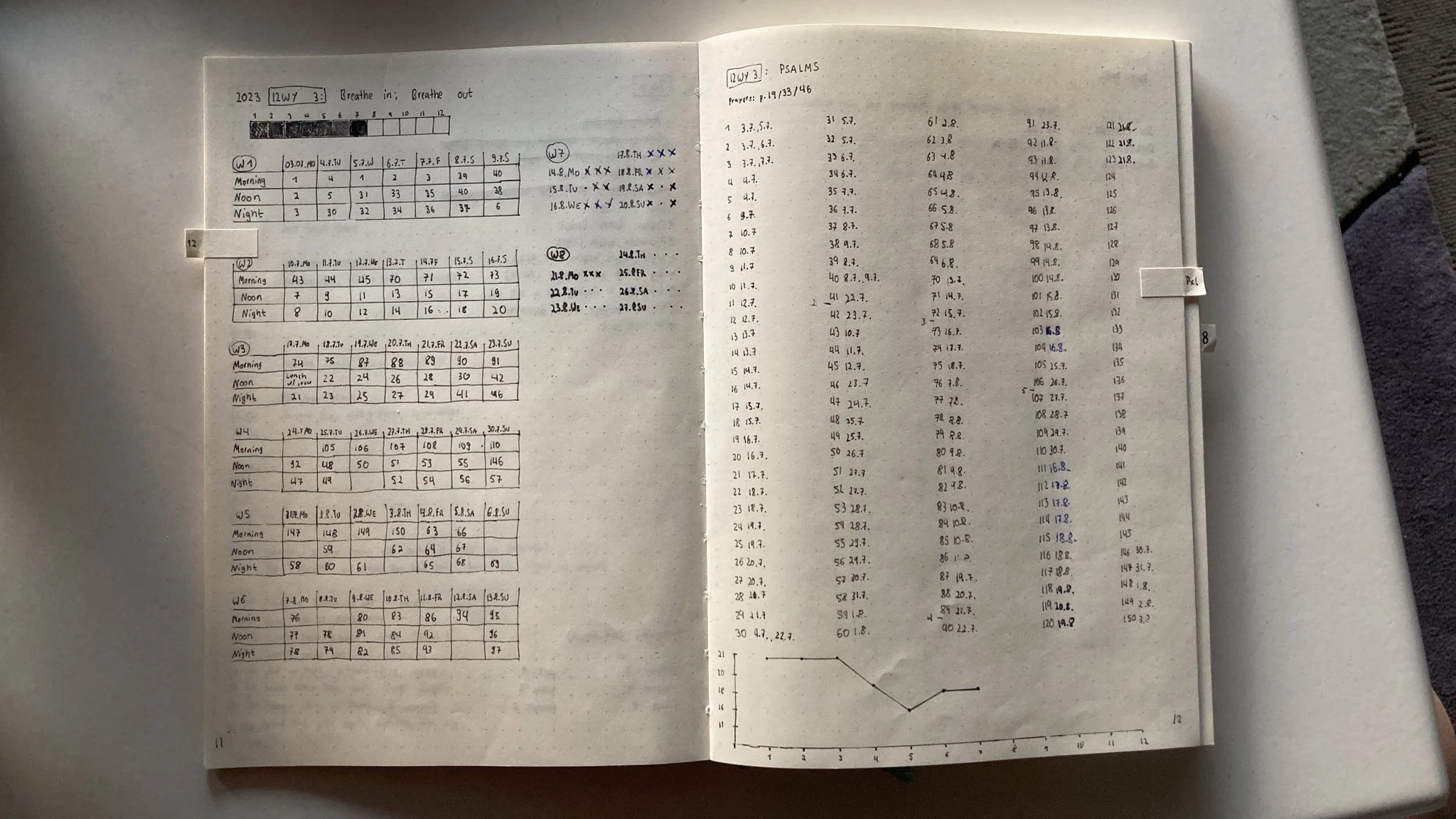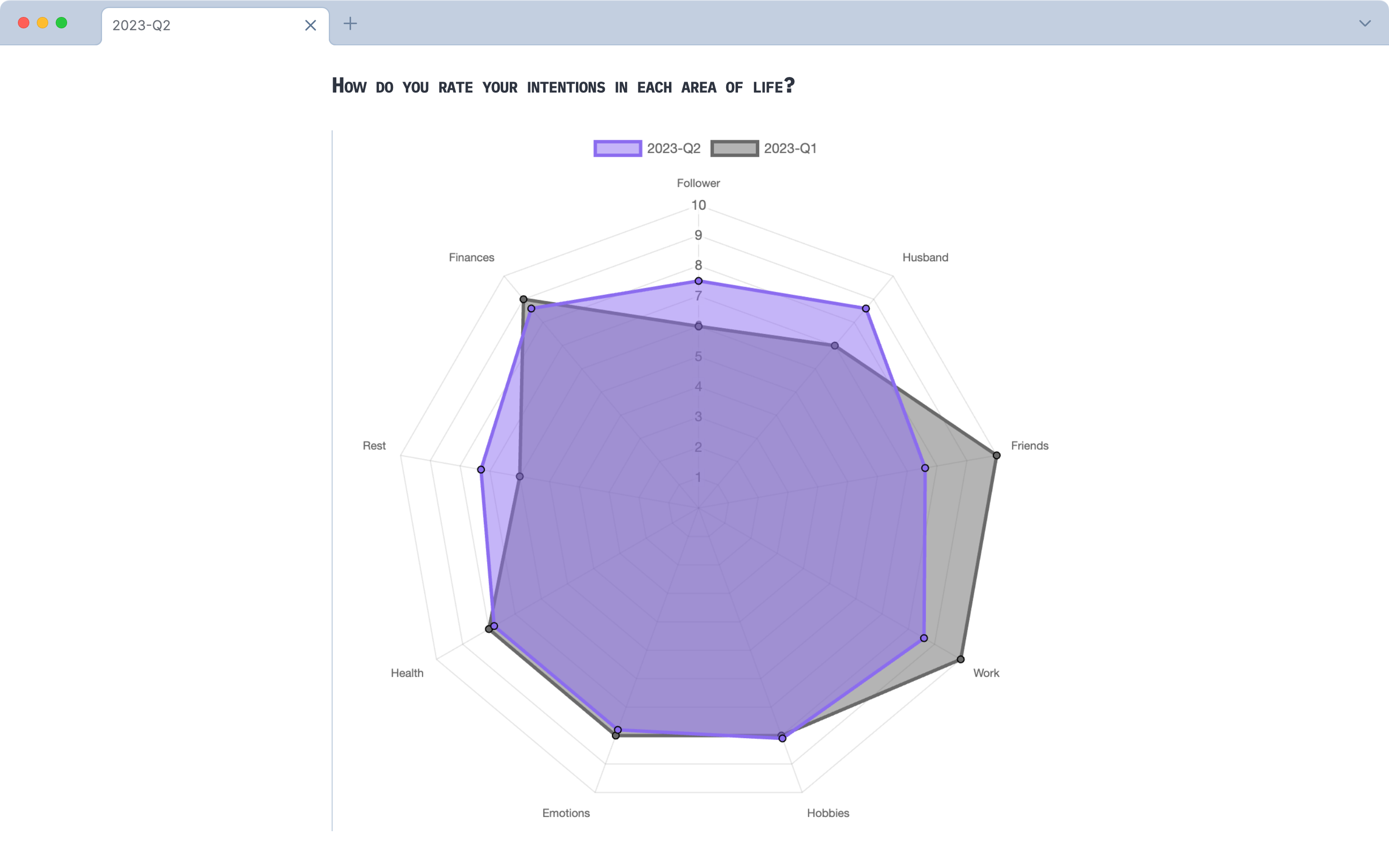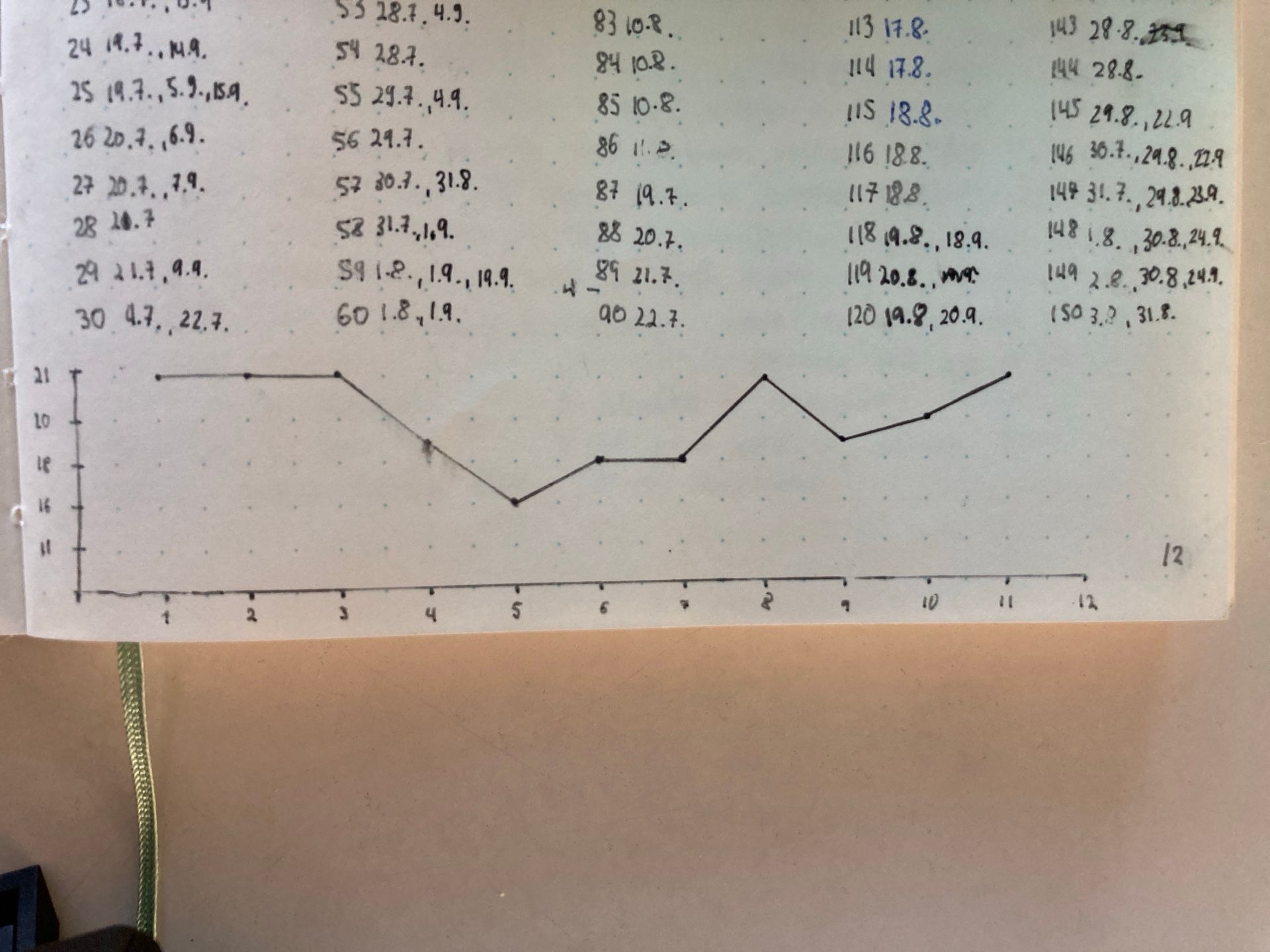Year of Psalms

Since the start of 2022, I have been following the 12 Week Year framework. You treat every twelve weeks as if they were a new year by reflecting and setting resolutions. My theme for Quarter 3 of 2023 was "Psalms and Prayer".
In a past quarterly review I noticed how my intentions around being a follower of Jesus were low.
 Follower was at 6 in Quarter 1 and 7.5 in Q2.
Follower was at 6 in Quarter 1 and 7.5 in Q2.
I was also reading the book Deeper which emphasises the importance of spending time in the Bible:
So as you seek to grow in Christ by becoming a deeper human, accept and embrace the truth that you will go deeper with Christ no further than you go into Scripture.
Ortlund compares Scripture and Prayer to breathing:
And praying is exhaling. Breathe in; breathe out. We take in the life-giving words of God, and we breathe them back out to God in prayer.
I took an honest look at my prayer and Bible reading practice. They were terrible! 😬 I rarely open the Bible outside of church. My prayer habit was essentially non-existent, I mostly prayed ad-hoc in reaction to my circumstances.
I wanted to try sitting in prayer and Scripture through my everyday. So I decided to start the Year of Psalms and Prayer1. For twelve weeks, I would read three Psalms daily: Morning, Noon and Night. I would then respond to this Scripture in Prayer.
This is my reflection on what was hard, what went well and what I learned.
What was hard
It is hard to hear yourself pray
I was mostly consistent and read three Psalms every day. But it is sort of hard to evaluate of how deep I actually went. Some days, I just skimmed over the words in a minute and was done. Sure, I read the words, but did they actually sink deep?
It is sort of hard to hear yourself pray. When I pray silently, there isn't a clear starting or stopping point. It is more that I am thinking towards God (?). Often it was hard to evaluate whether I actually prayed or "just" thought. Occasionally, I wrote down my prayers. That helped to centre me and gave me something to return to whenever my thoughts drifted.
Psalms were hard to relate to
Many Psalms were hard to relate to. David often feared for his literal life, being pursued by people who would kill him, and he prayed against them. I don't really have enemies 🤷♂️. I could make the "enemies" metaphorical, abstracting them into fear, insecurity, etc. But that feels reductive of the actual fear for his life that David writes of.
Life in those last twelve weeks was actually pretty good! There was no hardship in my life that compared to David's distress. So my prayers often quickly moved away from the essence of the Psalm to what was going on in my life.
At times though, when I felt lonely or overwhelmed, the Psalmist's utter reliance and trust in God were a real balm.
Hoping for more transformation
When reading in my lunch break at work, I hoped that reading a Psalm would centre me more. Sitting in God's presence and word definitely made me step outside the normal set of priorities and the bustle of the day job. It put things into perspective. But there wasn't a specific moment where I read a Psalm over lunch that really changed my behaviour going into work for the rest of the day.
Encountering Resistance
It was shocking to notice, but at times I really didn't want to open the Bible. I was almost repulsed by the idea of stepping into God's word. In The War Of Art Pressfield talks about how the more upbuilding an activity is to your soul, the more Resistance comes in. I think the believer can recognise how behind this "Resistance" there are spiritual powers who want to stop us from getting closer to God. I knew I would encounter God if I started reading, but something in me really didn't want to.2
It's important to recognise for the believer that the fight of building habits isn't just around willpower and systems. Meaningful change also faces spiritual resistance.
In the end, whenever I encountered resistance like this, it was my cue that I definitely needed to open Scripture.
What went well
I stuck with it
In general, I prayed three Psalms every day. Over twelve weeks, that's 234 Psalms. I only missed 18 Psalms during that time. I am happy with that.
David was someone who utterly relied on God. I hope by spending so much time in his humility and dependence, I internalised some of that as well. There were also many moments where the Holy Spirit made the words a reality for me. I was often touched by God's presence and felt the reality of God's goodness beyond the specific words in the Psalm. I was often overcome with awe and gratitude. When we seek him, he shows up.
Ironically, this happened most strikingly on the Psalm that people warned me most about. Whenever I would talk to people about reading through the Psalms, they'd jokingly reply "Oh, watch out for Psalm 119!"3, which is the longest one. But when it came time to actually read Psalm 119, the way the Psalmist unfolded the goodness of God and his word just left me in awe.
Community
I kicked this 12WY off by bringing some guys from church along. We read a Psalm daily and shared what stood out to us. That extra fellowship at the start boosted motivation and helped me establish the habit.
Sung Psalms
Occasionally, I listened to Psalms turned into song. There is a great Psalms playlist on Spotify. Especially the interpretations of a duo called Poor Bishop Hooper4 opened up the Scripture in a new way.
Space to intercede
I often didn't dwell on the Psalm but moved into personal prayer. Partly that was disappointing, but it also created a new space for prayer in my life. After reading a Psalm, often people would pop into my head and I'd start praying for them.
In one specific moment, a friend's daughter was sick, and they asked for prayer. During my Psalms routine, that came into mind and I prayed for her. God brought healing and she recovered quickly. Just by having space to pray in my everyday, I can make a difference in people's life by interceding for them.
Bias to grace
I counted a Psalm as "done" if I read it. I am glad I kept the metric simple. If I had forced myself to evaluate the "depth" of reading on each Psalm, I would have spent less time praying and more time double-guessing. A bias to grace in counting a habit successful produced momentum.
Clear cues
I always read the morning Psalms over breakfast, the noon Psalm during my lunch break and the night Psalm in bed before going to sleep. Clearly defined places and times make following a habit easier. Atomic Habits introduces the concept of "habit stacking": after existing habit, I will new habit. Anchoring a new habit to everyday routines like meals provided a clear cue for me.
Sense of speed
After a few weeks, I lost momentum. I was excited in the start. But now skipping an individual Psalm didn't feel that bad.
The silver bullet were a few lines in my bullet journal. I remembered how Andy Matuschak talked about the concept of "sense of speed": In app design, you want to clearly show users their progress and establish a feeling of them moving forward.
In my tracking so far, I just had a long list of Psalms that I ticked off every day. But there was no feeling of momentum.
I added a simple chart on my bullet journal spread.
 Week 5 is where I started the chart. Y axis: Psalms read, X axis: Weeks.
Week 5 is where I started the chart. Y axis: Psalms read, X axis: Weeks.
Each week, I'd score how many Psalms I read. This visualised clearly how well I did that week. It also made me competitive to beat last week's score. If you want to motivate a nerd like me, give them some nice visualisation 🤓
What I learned
My biggest takeaways around starting new habits were to have a clear cue by anchoring a habit unto existing ones and to create a sense of speed by tracking progress. It is also important to be aware that Resistance will try to counter any meaningful change.
When it comes to the practice itself, I am leaving this 12 Week Year with a new appreciation for Scripture. Reading God's word is just so good for the soul. I also enjoyed having space for prayer in my day and loved how much I prayed for other people. I want to keep creating room for that in my day.
Footnotes
- The Psalms as the prayer book of the Church felt like a natural starting point. ↩
- This is confronting to recognise. It is also encouraging. The Bible is so powerful, the Enemy throws everything he has at you to stop you from reading it. ↩
- I was a bit peeved by comments like this. We exalt Bible Reading, but once it is more than three paragraphs, that's too hard? 🤷♂️ ↩
- Poor Bishop Hooper released a psalm-based song every week for nearly three years! ↩